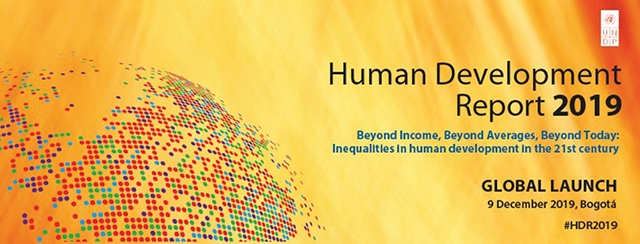UNDP: Georgia Ranks High in Human Development but Loses 12% of Progress through Inequalities
Georgia ranks 70 of the 189 countries covered by the 2019 Human Development Index (HDI) published on Monday by the United Nations Development Program (UNDP). Recognizing that human well-being depends on more than just money, the UNDP combines health, education and income to rank the world’s countries. This year, Georgia places ahead of Armenia at 81, Azerbaijan at 87 and Ukraine at 88, but behind Russia at 49, Belarus at 50 and Turkey at 59.
Georgia currently qualifies as a country of high human development. Between 2000 and 2018, the country’s HDI value rose from 0.669 to 0.786, an increase of 17.5%. Life expectancy at birth increased by 3.2 years, mean years of schooling by 1.1 years and expected years of schooling by 3.0 years. GNI per capita grew by about 19.8% between 1990 and 2018.
However, these achievements lose some lustre when the HDI value is discounted for inequality. For Georgia the loss is a discouraging 12%. “Georgia’s performance in improved living standards for its citizens is being undercut by inequality,” said Louisa Vinton, UNDP Head in Georgia. “This year’s human development report is a call to action to design and adopt policies to reduce disparities, whether between men and women, urban and rural areas, or the wealthy and the poor.”
Beyond income, beyond averages, beyond today
Inequality is the main theme of the analysis that accompanies this year’s Human Development Index. The new Human Development Report (HDR) argues that, despite unprecedented progress against poverty, hunger and disease, many societies are not working as they should.
“Different triggers are bringing people onto the streets - the cost of a train ticket, the price of petrol, demands for political freedoms, the pursuit of fairness and justice. This is the new face of inequality, and as this Human Development Report sets out, inequality is not beyond solutions,” says UNDP Administrator Achim Steiner.
The 2019 Human Development Report (HDR), entitled ‘Beyond income, beyond averages, beyond today: inequalities in human development in the 21st Century,’ says that just as the gap in basic living standards is narrowing for millions of people, the necessities to thrive have evolved.
A new generation of inequalities is opening up, around education, and around technology and climate change: two seismic shifts that, unchecked, could trigger a ‘new great divergence’ in society of the kind not seen since the Industrial Revolution, according to the report.
The report argues that while the middle-income countries of Europe and Central Asia have achieved higher living standards than ever before, climate change and technological disruption could severely slow down their efforts to reduce inequalities.
For instance, nearly 90% of the region’s energy comes from fossil fuels, and some 30% of land is classified as degraded. And while the region ranks in the middle tercile worldwide on research and development spending, its ratio of highly skilled to low-skilled workers is only half that of OECD countries, a gap that will become harder to close as technology advances in richer countries.
To address these challenges, the 2019 HDR proposes a battery of policy options, including lifelong investments in human productivity, education and social protection; policy reforms related to international taxation and public spending; systemic steps to close gender gaps in politics, economics and society; and policies crucial to tackling the climate crisis.
Global Human Development Index (HDI)
The 2019 HDR shows that impressive progress has been made in the HDI since 1990 and many countries have moved up through the human development categories: between 1990 and 2018 the number of countries classified as having very high human development rose from 12 to 62, while those classified as having low human development fell from 62 to 36.
The top five positions in the global HDI rankings are: Norway (0.954), Switzerland (0.946), Ireland (0.942), Germany (0.939) and Hong Kong (0.939). The bottom five are: Burundi (0.423), South Sudan (0.413), Chad (0.401), Central African Republic (0.381) and Niger (0.377).
Unequal distribution of human development gains in education, health and living standards within countries remains a challenge to achieving human development for all. The Inequality adjusted HDI (IHDI) shows that globally, 20% of human development progress was lost in 2018.
The empowerment gap between women and men, as measured by the Gender Inequality Index (GII), is narrowing but at a very slow pace. There are small gains globally in parliamentary representation (24.1% of seats held by women) and in reduction of adolescent birth rate (42.9 births per 1000 women of adolescent age), but the gap in economic empowerment persists (the labor force participation rate of women is still 27 percentage points lower than of men).
Georgia GII value ranks it 75 out of 162 countries. In Georgia, only 15% of parliamentary seats are held by women, and 97.4% of adult women have reached at least a secondary level of education compared to 98.6% of men. For every 100,000 live births, 36.0 women die from pregnancy related causes; and the adolescent birth rate is 46.4 births per 1,000 women of ages 15-19. Female participation in the labor market is 57.8% compared to 78.7 for men.
UNDP partners with people at all levels of society to help build nations that can withstand crisis, and drive and sustain the kind of growth that improves the quality of life for everyone. On the ground in some 177 countries and territories, we offer a global perspective and local insight to help empower lives and build resilient nations.











